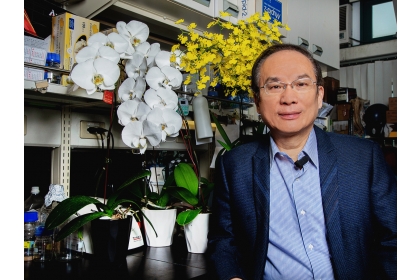Professor Yang Chang-Hsien of NCHU Elected as Academician of Academia Sinica's 34th Academician
2024-07-08
興新聞張貼者
Unit秘書室
1,837
On July 4, Professor Yang Chang-Hsien of the Graduate Institute of Biotechnology at National Chung Hsing University (NCHU) was elected as an Academician of the 34th Academician of Academia Sinica. Professor Yang specializes in floral biotechnology research, particularly in the areas of orchid flowering, floral organ development, and subsequent senescence. His work has been frequently featured in top plant science journals such as Nature Plants, Plant Journal, and Plant and Cell Physiology, making significant contributions to Taiwan's agricultural and floral industry.
Professor Yang stated that research on the regulation of flowering and floral development is highly competitive in the international plant science field. Since returning to Taiwan in 1994, he has focused on floral biotechnology research, investigating key genes involved in flowering, floral morphogenesis, gametophyte development, and flower senescence in various plants such as orchids, lilies, and Arabidopsis. His research emphasizes the molecular regulatory networks of these processes.
In his groundbreaking research on orchid floral morphogenesis, Professor Yang discovered that the formation of sepals, petals, and lips is regulated by two protein complexes. The "L complex" promotes lips formation, while the "SP complex" inhibits it. This discovery, known as the Perianth (P) code model, unveiled the mystery behind the "beauty of orchids" and made innovative contributions to international floral research. Published in the prestigious journal Nature Plants in 2015, his findings were highlighted as a cover story and recognized as a research highlight across all Nature series journals, garnering significant media attention worldwide.
Further studies by Professor Yang revealed that the B and AGL6 MADS genes in the SP and L complexes of the "Perianth code" not only play crucial roles in the formation of sepals, petals, and lips but also regulate flower color, sepal and petal senescence, and pedicel abscission. These groundbreaking findings were published in Nature Communications in 2021, significantly enhancing Taiwan's international academic standing. His achievements have earned him numerous honors and awards, including the Outstanding Research Award from the National Science Council, the Academic Award from the Ministry of Education, and the Lifetime National Chair Professorship, receiving high recognition and respect from both domestic and international scientific communities.
Additionally, the various "Phoenix Orchids" created by his laboratory were showcased at the Taiwan International Orchid Show (TIOS) in 2016 and the Taichung World Flora Exposition from 2018 to 2019, representing the pinnacle of Taiwan's floral biotechnology and attracting significant attention from the media and orchid industry professionals. These achievements have also led to several patents, paving the way for direct applications in the floral industry.
Professor Yang expressed deep gratitude for his election as an Academician, thanking the heavens for their generosity. He is grateful for the support from NCHU over the past 30 years, which provided the research environment and resources to pursue his interests. He also appreciates the efforts of his research team, the support of his family and friends, and the guidance of his mentors. He feels highly honored by this recognition, especially as few scholars in the field of plant science receive such distinction. His election represents not only personal honor but also recognition of Taiwan's plant science research community.
Professor Yang stated that research on the regulation of flowering and floral development is highly competitive in the international plant science field. Since returning to Taiwan in 1994, he has focused on floral biotechnology research, investigating key genes involved in flowering, floral morphogenesis, gametophyte development, and flower senescence in various plants such as orchids, lilies, and Arabidopsis. His research emphasizes the molecular regulatory networks of these processes.
In his groundbreaking research on orchid floral morphogenesis, Professor Yang discovered that the formation of sepals, petals, and lips is regulated by two protein complexes. The "L complex" promotes lips formation, while the "SP complex" inhibits it. This discovery, known as the Perianth (P) code model, unveiled the mystery behind the "beauty of orchids" and made innovative contributions to international floral research. Published in the prestigious journal Nature Plants in 2015, his findings were highlighted as a cover story and recognized as a research highlight across all Nature series journals, garnering significant media attention worldwide.
Further studies by Professor Yang revealed that the B and AGL6 MADS genes in the SP and L complexes of the "Perianth code" not only play crucial roles in the formation of sepals, petals, and lips but also regulate flower color, sepal and petal senescence, and pedicel abscission. These groundbreaking findings were published in Nature Communications in 2021, significantly enhancing Taiwan's international academic standing. His achievements have earned him numerous honors and awards, including the Outstanding Research Award from the National Science Council, the Academic Award from the Ministry of Education, and the Lifetime National Chair Professorship, receiving high recognition and respect from both domestic and international scientific communities.
Additionally, the various "Phoenix Orchids" created by his laboratory were showcased at the Taiwan International Orchid Show (TIOS) in 2016 and the Taichung World Flora Exposition from 2018 to 2019, representing the pinnacle of Taiwan's floral biotechnology and attracting significant attention from the media and orchid industry professionals. These achievements have also led to several patents, paving the way for direct applications in the floral industry.
Professor Yang expressed deep gratitude for his election as an Academician, thanking the heavens for their generosity. He is grateful for the support from NCHU over the past 30 years, which provided the research environment and resources to pursue his interests. He also appreciates the efforts of his research team, the support of his family and friends, and the guidance of his mentors. He feels highly honored by this recognition, especially as few scholars in the field of plant science receive such distinction. His election represents not only personal honor but also recognition of Taiwan's plant science research community.


